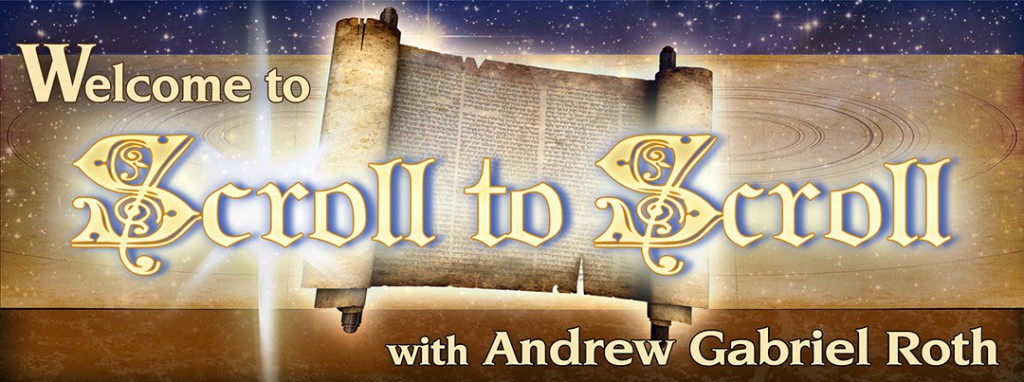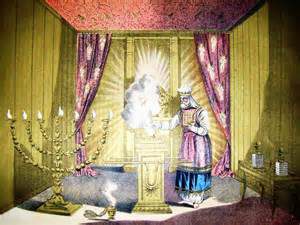Scroll to Scroll

Welcome to Scroll to Scroll, Torah portions with Andrew Gabriel Roth. Here you’ll find a list of our Torah portion teachings. We hope you enjoy.
Torah Portions
The Scroll to Scroll weekly Torah program is a 2 hour in-depth yet entertaining tour into the full breadth of the Scriptures. Every week, we give you the historical and linguistic tools you need to go deeper into weekly portion, otherwise known as “the parsha”.
In Part 1, we take you into the heart of the Torah portion by reading in English and teaching the in-depth and multi-layered Hebrew readings that permeate the Set-Apart original text. There is also considerable attention given to wider historical sources to substantiate and clarify the text as many long standing controversies and a few popular misconceptions are dealt with in proper chronological order. The first video then closes with an extensive vocabulary and linguistic discussion designed to bring you into the heart of how Torah has been discussed for thousands of years.
Part 2 then picks up with the Haftorah, or selected readings from the great prophets of old such as Isaiah, Jeremiah and Ezekiel, among many others, to show the careful way in which the original Torah message was discussed and analyzed throughout the entire Biblical period. That discussion then continues of course into the scheduled New Testament portion, where the words of our Savior Y’shua are put back into their first century original Hebraic context, both from Y’shua’s 1st century Hebrew culture and his native Aramaic language, and we close with the weekly “sermon” or “Torah Thought for the Week” to bring this Set-Apart and ancient text back to our modern needs, yearnings to shed light on critical spiritual matters affecting all of us today.
It’s a tour through the Scripture unlike any other on the web so I hope you will join us!
- Aharei Mot April 20, 2022

“Aharei Mot” means “after the death,” referring to the demise of Aaron’s sons Nadab and Abihu who offered fire in a way not sanctioned by Abba YHWH. The portion begins with the purification measures that Aaron and his remaining sons need to go through to rectify the evil that was …
- 2022 Pesach Special! April 13, 2022

From deep clues from Noah’s Flood to the death and resurrection of Yeshua the Messiah, explore the surprising history of Pesach from beginning to end!
Click Link to View and Download the Notes!
Complete Home Seder Guide!
Click Link To Download the Complete Seder Guide! - Metzora April 6, 2022

“Metzora” or more precisely “Ha Metzora” means “The Leper,” and the portion concerns primarily how a leper gets pronounced clean by the priests, how he demonstrates he has been cleansed from the disease. The previous Torah portion (Tazria) concerned states of impurity and isolation for women who have just given …
- Tazria March 30, 2022

Tazria means “to bring seed, give birth” It begins with the “niddah” rules, or how a woman is unclean for a certain period after giving birth. The rest of the portion then deals with how lepers are to be isolated and pronounced
clean by the priests before being allowed to rejoin … - Shemini March 23, 2022

Shemini means “on the 8th day” deals with the end of the priests’ consecration period. After this, they can then make expiation for all of Israel. Unfortunately however, two of Aaron’s sons pay the ultimate price for not ministering properly to the people. The portion then ends with the “kosher …
- Tzav March 17, 2022

Tzav means “command” as in commanding the sons of Aaron. It is another form of the same root we saw in an earlier parsha “tetzaveh” or “you will command/charge”. This time the focus of the portion is on the priestly responsibilities in preparing sacrifices.
Click Link to View and Download the …
- Vayikra March 9, 2022

“Vayikra” means “and he called” and seems focused on the details about the various offerings and sacrifices that are needed for and by the priests of Aaron. I say “seems focused” because there are a lot of deep spiritual realities laying beneath the surface when we delve into the meanings …
- Pekudei March 2, 2022

“Pekudei” means “these are the records/expenses” and the portion opens with giving the pricing values for the materials that will be used in the Tabernacle. Many exacting physical (and spiritual) details are given for all the wondrous objects and the Tabernacle. But after all these long lists (from this portion …
- Vayachel February 23, 2022

“Vayakhel” means “and he assembled.” The verb is derived from KAHAL, Hebrew for “assembly, congregation.” After a brief sermon on the importance of Shabbat, Moshe then gets the Israelites to work on the manifold details of building the Tabernacle and related furniture and objects.
Click Link to View and Download the …
- Ki Tissa February 17, 2022

Ki-Tissa means “when you take,” referring to what Israel is to do when it takes a census of all the people. Most censuses in the ancient world are used for the purposes of taxation. This census is no different, except the “tax” is not for an emperor, but for YHWH’s …
Torah 101
We often call our study process “walking” through Torah, because it is a wonderful journey that takes time and consistent effort, but it always bears great spiritual fruits for those who wish to understand the Scripture.
But not everyone wishes to go about this in the “total immersion” style of Scroll to Scroll, or they are on the go and need a shorter, more basic teaching. If that describes you, then you need “Torah 101”—the concise yet thought provoking journey through each week’s Scripture teachings. In less than half the time of the regular program, Andrew will distill the essence of the actual Torah portion down to its core message and walk you through the same majestic beauty and intricacies between both parts of our Bible. See the Torah, Prophets and the New Testament interconnect in a way you never saw before, and all in under an hour, to enable your “walk” in Scripture to deepen each week!
